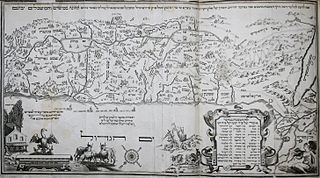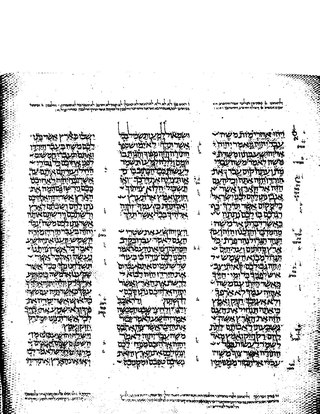
The Book of Joshua is the sixth book in the Hebrew Bible and the Christian Old Testament, and is the first book of the Deuteronomistic history, the story of Israel from the conquest of Canaan to the Babylonian exile. It tells of the campaigns of the Israelites in central, southern and northern Canaan, the destruction of their enemies, and the division of the land among the Twelve Tribes, framed by two set-piece speeches, the first by God commanding the conquest of the land, and, at the end, the second by Joshua warning of the need for faithful observance of the Law (torah) revealed to Moses.
The Book of Numbers is the fourth book of the Hebrew Bible and the fourth of five books of the Jewish Torah. The book has a long and complex history; its final form is possibly due to a Priestly redaction of a Yahwistic source made sometime in the early Persian period. However, this is a point of contention for many secular and biblical scholars. The name of the book comes from the two censuses taken of the Israelites.

Joshua also known as Yehoshua or Josue, functioned as Moses' assistant in the books of Exodus and Numbers, and later succeeded Moses as leader of the Israelite tribes in the Book of Joshua of the Hebrew Bible. His name was Hoshea the son of Nun, of the tribe of Ephraim, but Moses called him "Yehoshua", the name by which he is commonly known in English. According to the Bible, he was born in Egypt prior to the Exodus.

The Israelites were a group of Semitic-speaking tribes in the ancient Near East who, during the Iron Age, inhabited a part of Canaan.
Anakim are mentioned in the Bible as a possible race of giant humanoids descended from Anak.

Caleb, sometimes transliterated as Kaleb, is a figure who appears in the Hebrew Bible as a representative of the Tribe of Judah during the Israelites' journey to the Promised Land.

The Exodus is the founding myth of the Israelites whose narrative is spread over four books of the Torah, namely Exodus, Leviticus, Numbers, and Deuteronomy.

The Twelve Tribes of Israel are, according to Hebrew scriptures, the descendants of the biblical patriarch Jacob, also known as Israel, through his twelve sons through his wives, Leah and Rachel, and his concubines, Bilhah and Zilpah, who collectively form the Israelite nation. In modern scholarship, there is skepticism as to whether there ever were twelve Israelite tribes, with the use of the number 12 thought more likely to signify a symbolic tradition as part of a national founding myth.
Anak is a figure in the Hebrew Bible. His descendants are mentioned in narratives concerning the conquest of Canaan by the Israelites. According to the Book of Numbers, Anak was a forefather of the Anakim. Ten of the twelve Israelite spies described them as very tall descendants of Anak, compare Genesis 6:1–4. The text states that the giant stature of the Anakim was the standard by which other giant races were measured, such as the Rephaites, and that Anak was a son of Arba.

Shlach, Shelach, Sh'lah, Shlach Lecha, or Sh'lah L'kha is the 37th weekly Torah portion in the annual Jewish cycle of Torah reading and the fourth in the Book of Numbers. Its name comes from the first distinctive words in the parashah, in Numbers 13:2. Shelach is the sixth and lecha is the seventh word in the parashah. The parashah tells the story of the twelve spies sent to assess the promised land, commandments about offerings, the story of the Sabbath violator, and the commandment of the fringes.

Devarim is the 44th weekly Torah portion in the annual Jewish cycle of Torah reading and the first in the Book of Deuteronomy. It comprises Deuteronomy 1:1–3:22. The parashah recounts how Moses appointed chiefs, the episode of the Twelve Spies, encounters with the Edomites and Ammonites, the conquest of Sihon and Og, and the assignment of land for the tribes of Reuben, Gad, and Manasseh.

Transjordan is an area of land in the Southern Levant lying east of the Jordan River valley. It is also alternatively called Gilead.

Joshua 1 is the first chapter of the Book of Joshua in the Hebrew Bible or in the Old Testament of the Christian Bible. According to Jewish tradition the book was attributed to the Joshua, with additions by the high priests Eleazar and Phinehas, but modern scholars view it as part of the Deuteronomistic History, which spans the books of Deuteronomy to 2 Kings, attributed to nationalistic and devotedly Yahwistic writers during the time of the reformer Judean king Josiah in 7th century BCE. This chapter focuses on the commission of Joshua as the leader of Israel after the death of Moses, a part of a section comprising Joshua 1:1–5:12 about the entry to the land of Canaan.
War in the Hebrew Bible concerns any military engagement narrated or discussed in the Hebrew Bible, also known as the Tanakh or Old Testament of the Bible. Texts about war in the Hebrew Bible are part of the broader topic of The Bible and violence. They cover a wide range of topics from detailed battle reports including weapons and tactics used, numbers of combatants involved, and casualties experienced, to discussions of motives and justifications for war, the sacred and secular aspects of war, descriptions and considerations of what in modern times would be considered war crimes such as genocide or wartime sexual violence, and reflections on wars that have happened, or predictions, visions or imaginations of wars that are yet to come.

Joshua 5 is the fifth chapter of the Book of Joshua in the Hebrew Bible or in the Old Testament of the Christian Bible. According to Jewish tradition, the book was attributed to the Joshua, with additions by the high priests Eleazar and Phinehas, but modern scholars view it as part of the Deuteronomistic History, which spans the books of Deuteronomy to 2 Kings, attributed to nationalistic and devotedly Yahwistic writers during the time of the reformer Judean king Josiah in 7th century BCE. This chapter focuses on the circumcision and Passover of the Israelites after crossing the Jordan River under the leadership of Joshua, a part of a section comprising Joshua 1:1–5:12 about the entry to the land of Canaan, and the meeting of Joshua with the Commander of the Lord's army near

Joshua 13 is the thirteenth chapter of the Book of Joshua in the Hebrew Bible or in the Old Testament of the Christian Bible. According to Jewish tradition the book was attributed to the Joshua, with additions by the high priests Eleazar and Phinehas, but modern scholars view it as part of the Deuteronomistic History, which spans the books of Deuteronomy to 2 Kings, attributed to nationalistic and devotedly Yahwistic writers during the time of the reformer Judean king Josiah in 7th century BCE. This chapter records the list of land still to be conquered and the land allotments for the tribes Reuben, Gad and half of the Manasseh (east), a part of a section comprising Joshua 13:1–21:45 about the Israelites allotting the land of Canaan.

Joshua 14 is the fourteenth chapter of the Book of Joshua in the Hebrew Bible or in the Old Testament of the Christian Bible. According to Jewish tradition the book was attributed to the Joshua, with additions by the high priests Eleazar and Phinehas, but modern scholars view it as part of the Deuteronomistic History, which spans the books of Deuteronomy to 2 Kings, attributed to nationalistic and devotedly Yahwistic writers during the time of the reformer Judean king Josiah in 7th century BCE. This chapter records the preparation for the allotment of land and the inheritance for Caleb, a part of a section comprising Joshua 13:1–21:45 about the Israelites allotting the land of Canaan.

Joshua 21 is the twenty-first chapter of the Book of Joshua in the Hebrew Bible or in the Old Testament of the Christian Bible. According to 0Jewish tradition the book was attributed to the Joshua, with additions by the high priests Eleazar and Phinehas, but modern scholars view it as part of the Deuteronomistic History, which spans the books of Deuteronomy to 2 Kings, attributed to nationalistic and devotedly Yahwistic writers during the time of the reformer Judean king Josiah in 7th century BCE. This chapter records the designation of "Levitical cities", a part of a section comprising Joshua 13:1–21:45 about the Israelites allotting the land of Canaan.

According to the Hebrew Bible, the Tribe of Reuben was one of the twelve tribes of Israel. Unlike the majority of the tribes, the land of Reuben, along with that of Gad and half of Manasseh, was on the eastern side of the Jordan and shared a border with Moab. According to the biblical narrative, the Tribe of Reuben descended from Reuben, the eldest son of the patriarch Jacob. Reuben, along with nine other tribes, is reckoned by the Bible as part of the northern kingdom of Israel, and disappears from history with the demise of that kingdom in c. 723 BC.

According to the Hebrew Bible, the Tribe of Zebulun was one of the twelve tribes of Israel.









